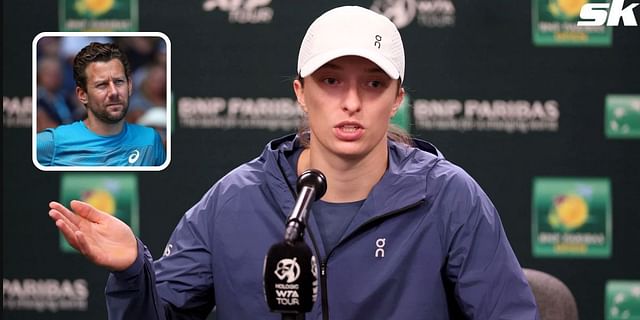
Tennis journalist Jon Wertheim has recently shared his insights into Iga Swiatek’s new coaching partnership with Wim Fissette, offering a thoughtful analysis of the potential challenges and dynamics that could arise. The announcement of Fissette’s appointment follows Swiatek’s decision to part ways with her long-time coach Tomasz Wiktorowski earlier this year. The transition has sparked intrigue within the tennis world, not only because of Fissette’s impressive resume, but also due to the specific nature of Swiatek’s game and her unique relationship with her sports psychologist, Daria Abramowicz.
Wertheim, a veteran tennis commentator, addressed the change in his *Sports Illustrated* mailbag, responding to a reader’s question about how he expects the partnership between Swiatek and Fissette to unfold. He began by acknowledging Swiatek’s extraordinary talent, praising her as an athlete of generational significance. However, he also pointed to a “real vulnerability” in her game, particularly outside of her favorite surface—clay. While Swiatek has been dominant on the red dirt, securing four French Open titles in her young career, her results at other Grand Slams have not been as consistent. Since her victory at the 2022 US Open, the World No. 2 has failed to progress past the quarterfinals of any Grand Slam tournament that wasn’t played on clay.
“Swiatek is such a fascinating player in some respects. She is dazzlingly talented. She is a concierge-level athlete. She could retire tomorrow and go down as a generational talent. And yet … there is this real vulnerability to her game. Especially off of clay, her results at majors are sorely lacking,” Wertheim commented, highlighting an area where the new coaching partnership could potentially focus.
Aside from her game, Wertheim touched on the personal challenges Swiatek faces, particularly her discomfort with fame and the public scrutiny that comes with being a top player. He noted that Swiatek often seems uneasy in the spotlight, which might hinder her ability to fully enjoy her time on the court. “For a top player, she projects so much discomfort. Part of that is humanizing,” Wertheim noted. While it makes Swiatek more relatable to fans, he expressed concern that this discomfort could limit her emotional freedom on the court. He suggested that for her sake, it would be encouraging to see her play with more visible joy and comfort in her role as a global tennis star.
One of the most significant aspects of Wertheim’s analysis involved the potential challenge Fissette might face when navigating Swiatek’s existing team dynamics. Swiatek is known to have an extraordinarily close bond with her sports psychologist, Daria Abramowicz, who has played an integral role in shaping her mental approach to the game. The presence of Abramowicz creates a unique dynamic, as Fissette will have to figure out how to integrate himself into a team where the mental side of Swiatek’s preparation is already being managed by another key figure. “Usually, the coach doubles as a motivator, hype man, and dimestore shrink,” Wertheim remarked. With Abramowicz already fulfilling that role, Fissette will need to find his place within the structure of Swiatek’s team. This creates a complicated dynamic that will need careful handling to avoid any friction or disruption to the established system.
Wertheim posed important questions about how Fissette and Abramowicz will coexist: “How will the organizational pieces fit together? How (and how well) will Fissette coexist with another team member? To be determined.” This relationship between coach and psychologist could be crucial to the long-term success of the partnership, and only time will tell how smoothly these two key figures will collaborate in guiding Swiatek’s career.
Adding his voice to the discussion, former World No. 1 Andy Roddick shared similar concerns about Fissette’s new role with Swiatek. On a recent episode of his *Served* podcast, Roddick emphasized the challenges of joining an already successful team. He raised the question of whether Fissette would feel the need to make significant changes or simply support what has already been working. “Going into a very established team that has had a lot of success, that has seen the top of the mountain, wedging yourself in there—do you want to make a bunch of changes?” Roddick pondered. He also speculated on whether the partnership is a long-term commitment or something the team is trialing for the rest of the year. “These are all these big macro questions. Have they already signed a deal for two years? Is this a thing that they’re going to try for the rest of the year? There’s a lot of this stuff that we don’t totally know yet,” he added.
The tennis world will soon get a glimpse of how this new coaching arrangement plays out, as Iga Swiatek prepares to make her debut under Wim Fissette at the 2024 WTA Finals. The high-stakes event, where Swiatek will aim to defend her title and reclaim the World No. 1 ranking from Aryna Sabalenka, presents an immediate test for the new partnership. Success at the Finals would provide an early indicator that the pairing with Fissette is off to a promising start, while any struggles could raise further questions about the adjustments Swiatek and her team will need to make going forward.
In summary, while Iga Swiatek’s new partnership with Wim Fissette is filled with promise, it also presents its fair share of uncertainties. From her vulnerabilities on non-clay surfaces to the intricate dynamics between Fissette and her psychologist Daria Abramowicz, the road ahead for the World No. 2 will be interesting to follow. As the tennis world waits to see how these factors play out, Swiatek’s fans will be hoping that this new chapter in her career brings continued success and greater consistency across all surfaces.
Leave a Reply